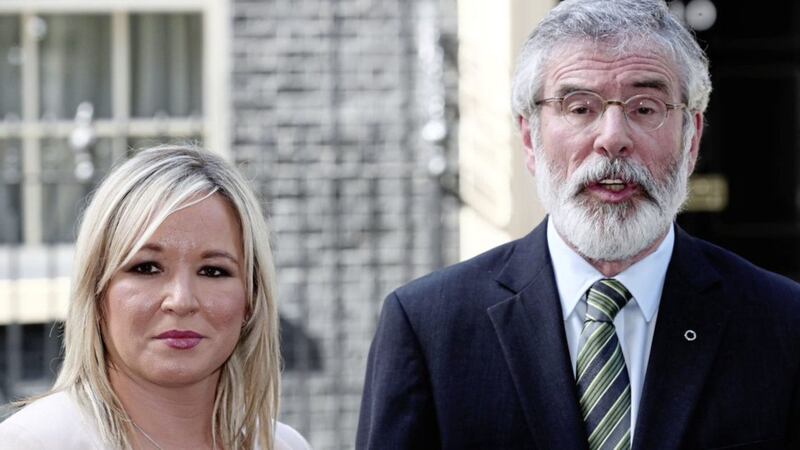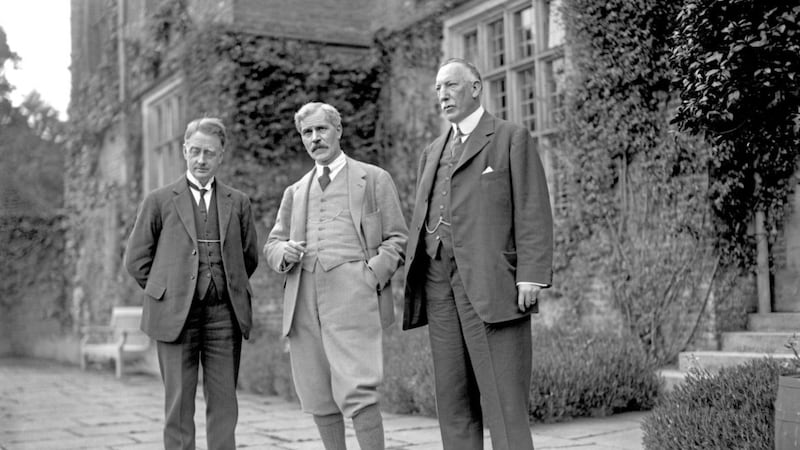Any doubts that devolution is returning have been dispelled by Gerry Adams. In a press conference before Stormont talks resumed, the Sinn Féin president offered to meet the DUP “halfway” on “outstanding issues” - a major shift in position, having previously defined those issues as outstanding agreements to be delivered in full. On the first day of talks, Adams added that Stormont is the route to a united Ireland, which can only have been about preparing supporters for the inevitable. Given current Westminster arithmetic, double-abstentionism is unsustainable for a party of Sinn Féin’s size. It has to show up for work somewhere and Stormont is the obvious choice. However, Stormont will be unsustainable if Sinn Féin has to slink back in with its tail between its legs. The DUP needs to invest some of its new political capital in a better relationship with the nationalist community, otherwise the executive will just collapse again.
**
Sinn Féin’s Westminster abstentionism has also taken a wobble. All signs were that the party had planned to spend this week parading its new MPs in front of the Dail, where they would have demanded speaking rights. This is hardly a new policy but it was being highlighted before last week’s election and should have been even more prominent due to Sinn Féin’s record-breaking tally of seven seats. Instead, everyone first had to be rushed over to London to look useful.
**
People across Ireland are suddenly feeling protective of the DUP. It is a strange, dirty feeling (not the kind the DUP would ban - the other kind.) As one commenter on the Irish Times website wrote: “I never thought I’d see the day when I would speak up the Rev Ian’s party, but it has come.” This sympathy - admittedly far from universal - has been driven by a deluge of abuse from Britain, so broad it seems targeted at us all. However, at its heart it is specifically targeted at DUP policies on abortion and same-sex marriage, which may now have to change. The DUP had hoped to keep its social policies isolated to Northern Ireland while demanding economic concessions from London. It has attracted too much attention for this unionist partitionism to work. Ironically, the DUP’s recent success makes a solution to same-sex marriage more difficult. It may win enough seats in a post-talks Stormont election to raise a petition of concern on its own, meaning it would have to take full responsibility for either blocking legislation or letting it through. The DUP has had cover on abortion through the similar policies of most other Stormont parties. But an abortion referendum just announced in the Republic is likely to put clearer water between Sinn Féin and everyone else.
**
The Good Friday Agreement requires the “sovereign government with jurisdiction” over Northern Ireland to exercise “rigorous impartiality on behalf all the people”. Many are asking how this can be compatible with a DUP-Tory Westminster alliance. A common reply is that Sinn Féin wants to be in government in Dublin - but this is pure whataboutery, as Dublin is not sovereign. However, it does raise a question over Sinn Féin’s long-term plan to create a united Ireland by getting into office on both sides of the border - as just restated by Gerry Adams. The same paragraph in the agreement makes clear that the choice of sovereign government in Northern Ireland is up to a majority of its people, as exercised in a border poll. If nationalism won a poll in the north, would Sinn Féin have to leave office in the south?
**
The Sun used to perform ‘reverse ferrets’. Now Private Eye has performed a reverse Skibbereen Eagle, warning DUP politicians that the national press has its eye on them. “They can now expect close scrutiny from the London tabloids who have deeper pockets than the Belfast rags and fewer reasons to pull their punches than Northern Irish hacks who bump into DUP honchos in their local supermarkets,” the magazine thundered. This would be more impressive if some of London’s most prominent newspaper and broadcast journalists had not spent the past week making laughable mistakes about the most basic aspects of Northern Ireland politics. Perhaps if they spend some time in supermarkets when they are here, instead of filing clichéd reports from peace lines, they might gain a better sense of what is actually going on.
**
Amid all the fake news in Britain about Northern Ireland, fake news continues to emerge in Northern Ireland. The SDLP is being widely accused by Sinn Féin supporters of causing its own Westminster wipe-out, by failing to sign up to a ‘progressive pact’ to save its south Belfast seat. In fact, while Sinn Féin asked the SDLP to stand down in north Belfast, it insisted on continuing to run in south Belfast (and indeed everywhere else) so the SDLP had nothing to lose. The DUP ended up winning.
newton@irishnews.com









